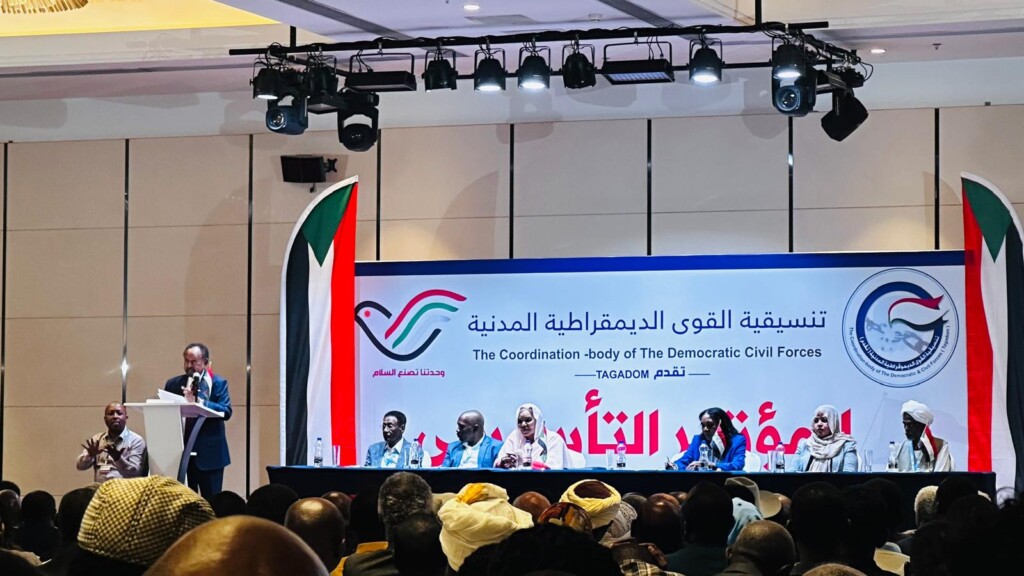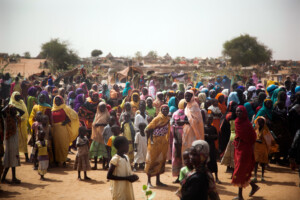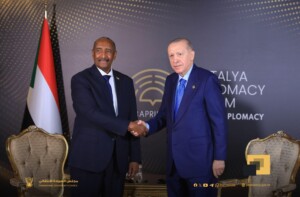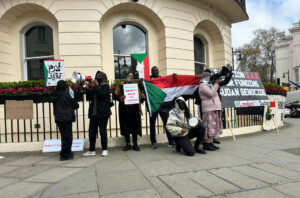Former Sudan PM Hamdok confirmed as Tagadom president

Former Sudan PM addresses the closing session of the conference of the Civil Democratic Forces (Tagadom) in Addis Ababa (Photo: Radio Dabanga)
The founding conference of the Civil Democratic Forces (Tagadom) took place in Addis Ababa from 27-30 May, resulting in the confirmation of former Sudanese Prime Minister Abdalla Hamdok as the coalition’s president. The conference approved a political paper and revamped the organisational structure representing political forces, unions, resistance committees, civil society, and the Sudan Revolutionary Front (SRF). Heated discussions were held voicing various political opinions, with some friction over calls to cancel the Addis Ababa declaration signed between the Rapid Support Forces (RSF) and Tagadom.
The founding conference concluded with Hamdok elected as head of Tagadom. He reached out to Sudanese opposing the war, including those outside Tagadom, emphasising the coalition’s inclusive nature. Hamdok called for an end to hostilities, stressing that the war only results in death and destruction, and underscoring that each Sudanese life lost is a loss for the nation.
The structure paper, adopted and approved by the general conference, includes the leadership body, members of the general secretariat, and other attendees with Tagadom membership. To ensure representation and balance, the paper was approved by a simple majority of the leadership body, which comprises political parties (25 per cent), professional organisations and unions (25 per cent), resistance committees (20 per cent), civil society groups (20 per cent), and the SRF rebel alliance (15 per cent). Additionally, 20 seats are allocated to specific groups represented in special committees, ensuring that its representation reflects all regions of Sudan.
The general conference, as the highest legislative authority, has the power to approve and amend the statute, political vision, and programs, and to ratify the membership of the leadership body. It reviews and evaluates the leadership’s performance and approves the general strategy every four years. Furthermore, it can approve or cancel legislative decisions made by the leading body when the general assembly is not in session.
The political paper discussion saw a heated debate. While some groups advocate forming a ‘shadow government in exile’, others reject this proposal. Participants agreed not to recognise the current de fact government in Port Sudan, viewing it as “a war government promoting continued conflict” – which previously filed criminal complaints against 17 Tagadom leaders.
During a session chaired by El Hadi Idris, leader of the Sudan Liberation Movement-Transitional Council (SLM-TC) faction and head of the SRF rebel alliance, voices called for cancelling the Addis Ababa Declaration signed between the RSF and Tagadom in January 2. This recommendation was not approved, as the declaration is seen as a step towards an agreement with the Sudanese Armed Forces (SAF), requiring careful implementation by the RSF, especially regarding stopping violations and releasing prisoners.
Tagadom opposition
In May, a group of 48 Sudanese political and civil blocs signed a charter, entitled Understanding Framework Vision for Managing the Transitional Founding Period, in the Egyptian capital of Cairo, outlining their vision to manage the transitional period after the war.
The signatories of the Cairo Charter, that back the Sudanese Armed Forces (SAF), aim to determine the future of governance in Sudan through an inter-Sudanese dialogue.











 and then
and then